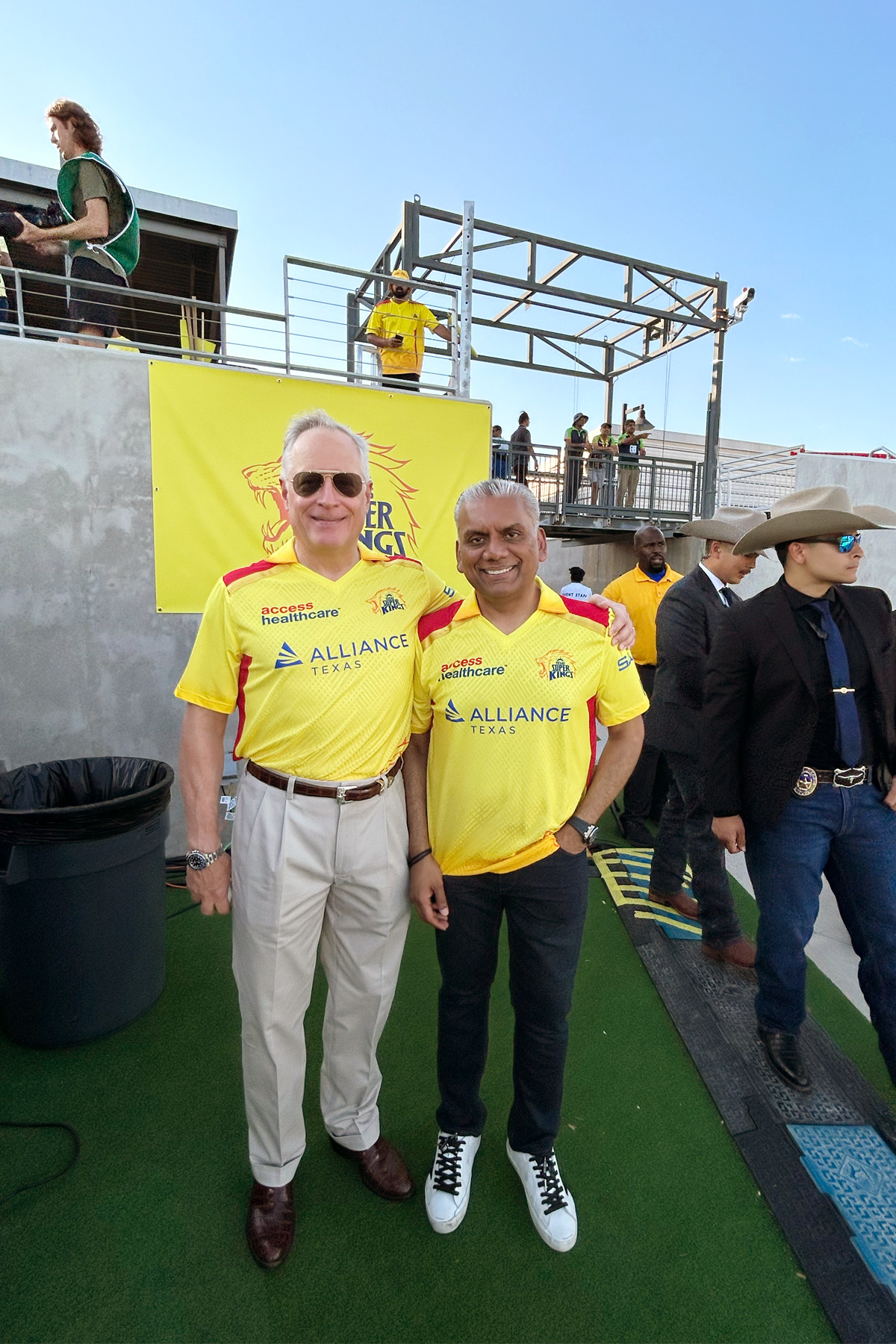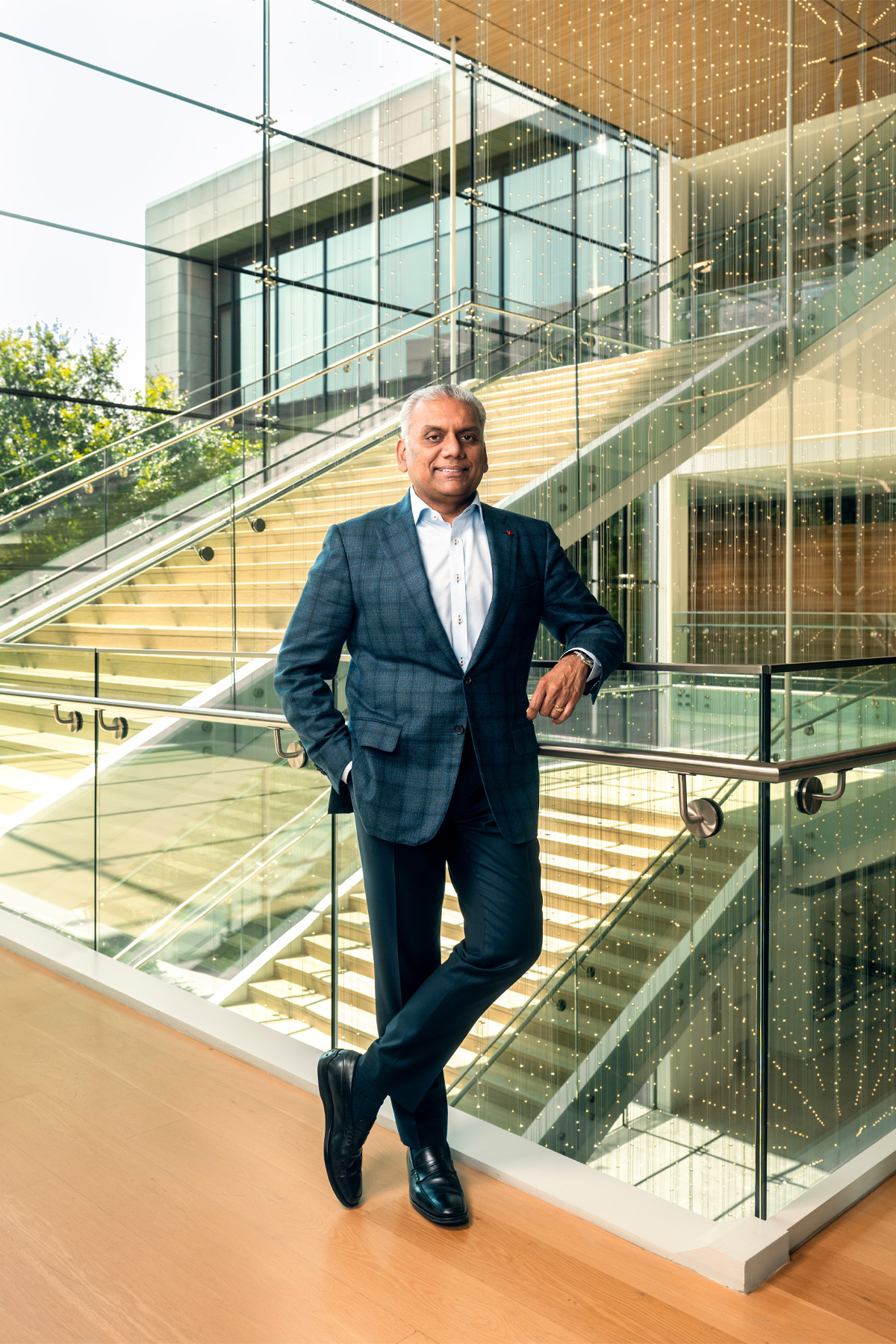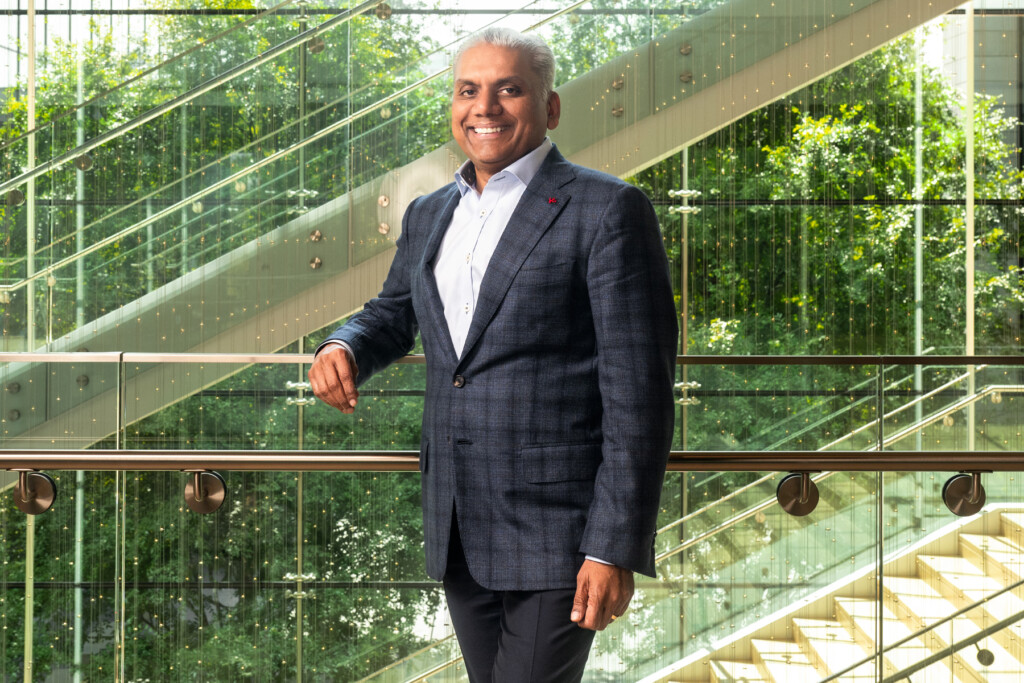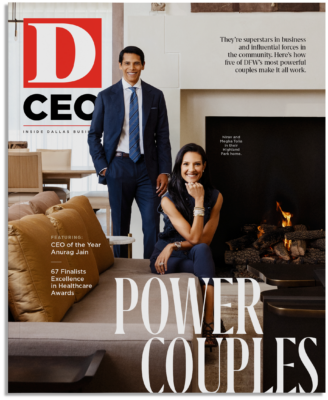Anurag Jain was 16 years old when his father sat him down and gave him two career choices: become a doctor or an engineer. At the time, Jain wanted to be a professional cricketer or a philosopher—an Indian teenager’s vision of the centuries-old warrior poet. Jain’s father was a civil engineer who helped build the interstate highway system in the U.S. before returning to India to live a comfortable life in Chennai. But Anurag didn’t want to go through life being known as Mr. Jain’s son, so he cut his own path from Chennai to Dallas, a winding journey that molded him into one of the leading corporate figures in DFW.
As it turns out, Jain’s career more closely resembles that of a philosopher or professional cricket player than his father would have endorsed back in Chennai, though he did get an electrical engineering degree. He is a good son, after all. But engineering was only the beginning of a career that includes being a healthcare CEO, venture capitalist partner of the Perot family, professional sports team owner, and philanthropist—so far.

While earning his MBA at the University of Michigan in the early 1990s, Jain often spent time thinking about the future of business. He wrote a paper describing his belief that American businesses would be able to build global brands, but these company’s manufacturing jobs would head to China. Just as Jain predicted, major brands would remain in the U.S. and outsource manufacturing and back-office roles abroad.
His professor gave him an A—and Jain set out to build a business that tested his beliefs. He first worked as an adviser, helping an American company set up an office in India. But the structure of the consulting world wasn’t for him. “I was a minion,” Jain says. “You have to work your way up within the structure. And I don’t know how to do that.”
His father gave him $5,000 to start a business and told him he would have a job waiting for him after he ran through it. But Jain was determined to avoid joining his father. His business plan was to connect with physicians in America of Indian descent. He wanted to make their lives easier and outsource their revenue cycle management—basically, ensure the physicians collected payment from insurance companies and patients after receiving care. “There are a lot of doctors I’ve met who are Indian, and they’re going to trust me,” Jain says. “Well, they didn’t. They said, ‘We’ve left India, and we’ve seen this movie before.’”
“He’s a special man, a visionary, and sees the world differently than I do. But it’s more than a business relationship; it’s a trusted friendship.”
Ross Perot Jr., The Perot Cos. and Hillwood
Despite early bumps in the road, Jain started a company, but he and his three employees were hard-pressed to find their own office space in India. They landed at a crude predecessor of co-working with four chairs around a table protected by movable half-partitions inside another company’s loud and pungent cafeteria. Each day, Jain and company would push the partitions a few inches out to grow their office space, and each day, the landlord’s administrator would push them right back.
The early days of the cafeteria office were a rocky road. Jain says he nearly went bankrupt 17 times—but he kept at it. “I was one of the most unsuccessful entrepreneurs on the planet,” he says. “I cannot tell you how I survived being that bad for that long. But there was this drive, and I knew it would succeed.” One challenge was the idea of using outsourced labor, which was more controversial than it is today. Jain remembers telling a hospital leader in charge of revenue cycle of his plan to use workers overseas. “Over my dead body, son,” he told Jain.
Others may have shied away from pushing the deal at that moment. But as several who worked with him shared, Jain can find ways for his success to be others’ success and for him to see your problems as his problems and find ways to solve them together. So, he approached the hospital executive with another idea that would lead to his first big break.
The hospital didn’t bother following up on bills under $1,000, but Jain offered to do just that. Jain helped the hospital follow up with payers on those bills, which were small but numerous. They added up. And in the end, Jain says, the hospital increased profitability by 40 percent.
The company continued to grow, and Jain eventually sold it to Perot Systems in 2003. He didn’t see himself lasting long in a major corporation, but he met two of his lifelong mentors in its executive ranks: Hillwood Chairman Ross Perot Jr. and Peter Altabef, currently CEO of Unisys Corp., a $2 billion tech company. They saw his potential and frustration with hierarchy, so they kept him around and engaged by giving him a new role and a fresh problem to solve every six months.
How Perot Jain Helps New Enterprises Lift Off
Anurag Jain became fast friends with Ross Perot Jr. when Perot Systems bought Jain’s company. Later, when Dell bought Perot Systems, both leaders spent time with the tech giant. But after Jain left the company and Perot left the board, the two reconnected to get back to their entrepreneurial roots. The duo created venture capital firm Perot Jain, where Jain serves as managing partner. The firm has invested in more than 50 companies, concentrating its investments in AI, robotics, and other technologies impacting the future of mobility, human longevity, and quality of life. When Booster Fuels CEO Frank Mycroft reached out to Perot and Jain to see if they might have ideas for potential customers for his mobile fueling startup, the two did him one better. They decided to invest in his company, even getting him an apartment in DFW so he could pilot his company at Hillwood’s Mobility Innovation Zone. Fast forward eight years and a company relocation to California, and Mycroft still speaks frequently with Jain. He is struck by Jain’s hospitality and care for the entire individual while still maintaining a sharp eye for a disruptive idea. Mycroft cherishes the memory of being invited to Jain’s house for a daylong brainstorming session in the early days of Booster Fuels, which added $125 million of funding last year to expand its renewable and traditional fuel delivery platform. “Anurag had an expanded vision of what we could do together more than I even had myself,” Mycroft says. “He makes fast decisions when needed, and his bias to action is off the charts.”
Stepping in to Serve a Need
Perot Systems was based in Dallas, but the Jains lived in Chicago at the time and resisted encouragement to move to the mothership. Jain told Altabef that the only thing that would get him to Dallas was if Altabef was named CEO of Perot Systems. One Friday in 2004, as he left the Perot Systems office in Dallas to catch a flight back home, Jain told Altabef that his wife had finally found the perfect house for them to buy near Lake Michigan. “You can’t buy that house,” Altabef told him. “Why not?” Jain asked. “I can’t tell you,” Altabef cryptically responded. “Just give me a call on Monday at 7:45 a.m.”
Bewildered, Jain returned home to tell his wife they couldn’t buy their dream home, knowing it would be off the market by Monday morning. He made it through the weekend and, on Monday, called Altabef, who told Jain he would be announced as CEO of Perot Systems at 8 a.m. that morning. “Remember your promise?” Altabef said. The Jains were moving to Dallas.

Jain worked with Perot Systems to navigate through more than 10 acquisitions, and in 2009, Perot Systems sold to Dell. Jain saw his opportunity. The transition would mean a chance to give entrepreneurism another shot—or so he thought. Unbeknownst to him, the sale had a provision that required someone of his stature to stay with the company for a period of time.
Jain made the best of it, taking in what it meant to go from a Fortune 500 company to a Fortune 50 operation, and ended up running a $3 billion portion of Dell’s business as vice president of services and delivery. The relationships and experience he gained proved invaluable.
“Anurag had an expanded vision of what we could do together more than I even had myself. He makes fast decisions when needed, and his bias to action is off the charts.”
Frank Mycroft, Booster Fuels
Jain’s drive to innovate and serve took the family back to India to start a series of civically minded businesses. One used technology to build a home for $200; another introduced telemedicine to rural India at a time when it wasn’t ubiquitous. It was the third enterprise that caught on.
The Indian government set aside $1 billion to provide vocational training to Indians, with the goal of putting millions of people to work in durable careers. Jain played a significant role in developing the National Skill Development Corp. The nonprofit public limited corporation now has 538 training partners and 10,373 training centers with a mission to train more than 100 million in the next 25 years.

“Anurag knows how to bridge the U.S.-Indian gap very well,” says former boss and current venture capital partner Ross Perot Jr. “He connects well within the U.S. and very well in the Indian world. Very few people know how to operate in India, and that’s a big benefit for him.”
After a couple of years of living in his home country, Jain and his family returned to Dallas. He had received a call from a former coworker who had built a company that outsourced revenue cycle management for healthcare companies. It was right in Jain’s wheelhouse, but there was one problem: it ran out of funds and was losing a couple million dollars each year.
Jain wasn’t sure he wanted to jump aboard a sinking ship, but he smelled an opportunity. As he studied the troubled enterprise, he realized it was working with static processes and technology, and the model was ripe for a generational shift.
Jain took the job, applying what he learned about scalability and company culture from Perot Systems and Dell to grow the business serving the health system market. He built better technology to allow the systems and physicians to outsource back-office responsibilities and focus on what they do best. “While doctors focus on patients and give them more care, we take away all of the other nonsense that they have to deal with,” says Jain, now the president and CEO of Access Healthcare, which provides comprehensive business process outsourcing and automation for healthcare organizations. It has more than 100 clients supporting 500,000 providers and processing $100 billion in accounts receivable since its founding.
Access’ growth has paralleled an ongoing rise in burnout among physicians, a war on talent in healthcare, and cost squeezes plaguing hospitals. A Kaufmann Hall report found that half of Texas’ hospitals lost money in 2022 and predicted 2023 to be equally challenging. Access offers a way for practices and health systems to offload non-patient care responsibilities and save money. Since Jain took the helm in 2012, he has grown it from 100 employees to 25,000 worldwide and created a recruiting app along the way.
Boosting one of the World’s Most Popular Sports
As one of the fastest bowlers in town in his teenage years, Anurag Jain dreamed of an athletic career. But in those days, even the pros had to take second jobs to make ends meet, so he took another path. But the desire to be connected to the world’s second-most popular sport never died, and when he was approached by a group trying to bring pro cricket to the U.S., he signed up to partner with one of India’s best cricket clubs–the Chennai Super Kings–which also happens to be his hometown team. It took a few years to come together, but Texas Super Kings launched this spring as one of six teams in Major League Cricket, a league propelled by $120 million in funding from Jain, Ross Perot Jr., Microsoft’s CEO, and others. The team plays in a refurbished minor league baseball stadium in Grand Prairie and completed its first season this summer. The Grand Prairie stadium, designed by HKS, sold out for 80 percent of the games. All league matches were played in Grand Prairie or North Carolina, providing a home for the league while the other teams develop their stadiums. It’s still a work in progress, but Jain is looking ahead to adding teams and stadiums to the league in the future. Ever the connector, Jain is excited about the Chennai partnership with the Texas Super Kings, laying the groundwork for a pipeline of talent and knowledge from India to Texas. “We bring their brand, their knowledge, their capability and combine it with our knowledge of Texas and put it all together,” he says. “That has gone well for us.”
Keeping a Low Profile
The company’s growth was a confirmation of what Jain believed in that noisy cafeteria in the early days, but he values more than the bottom line. Colleagues say he values relationships and is generous with his time, especially in moments of uncertainty. Jain played a crucial role in the growth of Athenahealth, a healthcare technology platform with 6,000 employees today that sold to private equity for $17 billion in 2021. George W. Bush’s cousin Jonathan Bush founded Athenahealth as a woman’s health and birthing center in 1997. Jain helped him automate processes and has remained a critical friend and adviser. “How many other people think Anurag is their one deep consigliere?” Bush asks.
During the pandemic, Jain co-founded Get Shift Done to provide job opportunities that found out-of-work hospitality employees work in hunger-relief nonprofits, serving more than 60 million meals and employing 28,000 workers in the U.S. and India.

A difficult moment at Dell helped him discover another community passion. A significant reduction in force meant that he had to let several people on his team go, and one confided in him that he didn’t know if he would have enough to eat after losing his job. It woke Jain up to the reality of need. Later that day, he says he drove by a billboard for the North Texas Food Bank and reached out. When his wife called, she found the woman on the other end spoke Hindi, and the two bonded as the family plugged into fighting hunger in Dallas. “I had my bubble burst,” Jain says. “At that time, you didn’t see poverty as much in your face so that you could turn it off. When we learned that one in six people don’t know where the next meal is coming from, it changed our perspective.” He increased his involvement and was named chairman of the board of the North Texas Food Bank, where he is now its chairman emeritus.
Through his professional and personal efforts and achievements, Jain’s impact is nearly unparalleled in North Texas—earning him a unanimous choice among D CEO editors as the publication’s 2023 CEO of the Year. Yet, he maintains a relatively low profile and is often hesitant to speak about himself. His sense of perspective, his prioritizing of relationships, and his ability to make those he speaks with feel as though they are the most important person in his world make him unique among business leaders of his echelon.
Ross Perot Jr. frames Jain’s ability to see the future clearly while fully present. “He’s a special man, a visionary, and sees the world differently than I do,” Perot says. “But it’s more than a business relationship; it’s a trusted friendship.”
Author








